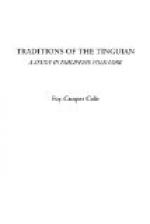He begged her and he cut the betel-nut, which was to be chewed, which was covered with gold, and he gave it to the woman who had magical power, and they chewed. When she laid down the quid, it looked like the agate bead, which has no hole for the thread. And the quid of Ini-init looked like a square bead.
“My name is Ini-init, who often goes to travel over the world. I always stop in the afternoon. What can I do, it is my business,” he said. Aponibolinayen was next to tell her name. “My name is Aponibolinayen, who lives in Kaodanan, who am the sister of Awig,” she said, and when they had finished telling their names, both their quids looked like the agate bead which is pinoglan, which has no hole. Ini-init said, “We are relatives, and it is good for us to be married. Do not be afraid even though you did not come here of your own accord. I go to Kaodanan,” he said. Then they married, and the sun went to shine on the world, because it was his business, and the big star also had business when it became night. Aponibolinayen staid alone in the house, and in the afternoon the sun again went home, but first he went to fish in the river. He went home when he had caught the big fish for them to eat—both those married. And when he arrived in their house he found Aponibolinayen, who was cooking, and he saw that she still broke up the fish-stick, which she cooked. Ini-init asked her, “What are you doing with that stick which you are breaking, which you put in the jar?” and Aponibolinayen replied, “I cook for us both to eat,” and the sun laughed, because she cooked the stick. “You throw away that stick which you are cooking; this fish which I caught with the net is what you are to cook. It is not eatable that fish-stick which you cook,” he said. Aponibolinayen said, “You shall see by and by, when we eat, what it will become. You hang up the fish which you caught, which we shall eat to-morrow.” “Hurry up! You throw away that stick which you cook, it has no use. Even though you cook for one month, it will not become soft, and I do not think it will become good,” said Ini-init. Aponibolinayen said, “No, you hurry and hang that fish which you caught with the net, because it is nearly cooked—the rice and the fish.” Not long after she took out the rice from the jar, and she uncovered her cooked fish, which was a stick. When the sun saw that the fish came from the stick which she cooked, he was surprised and he asked her how she made the stick, which she cooked, turn to fish. Aponibolinayen said, “You hurry come and eat, for I have finished taking out the rice and fish.” [95]
Not long after that the sun went truly in front of her to the place of the rice and cooked fish, and they ate.




